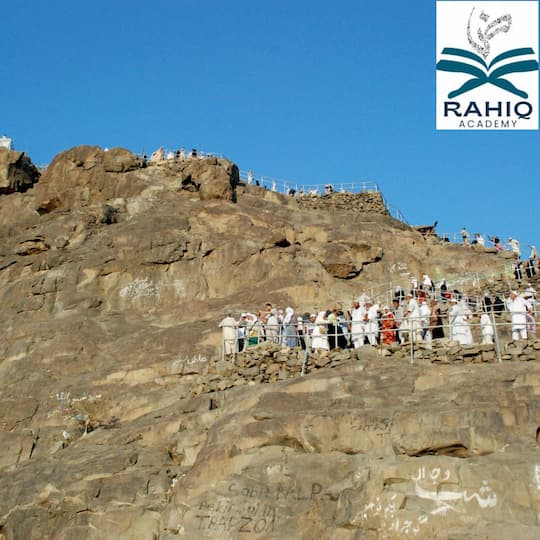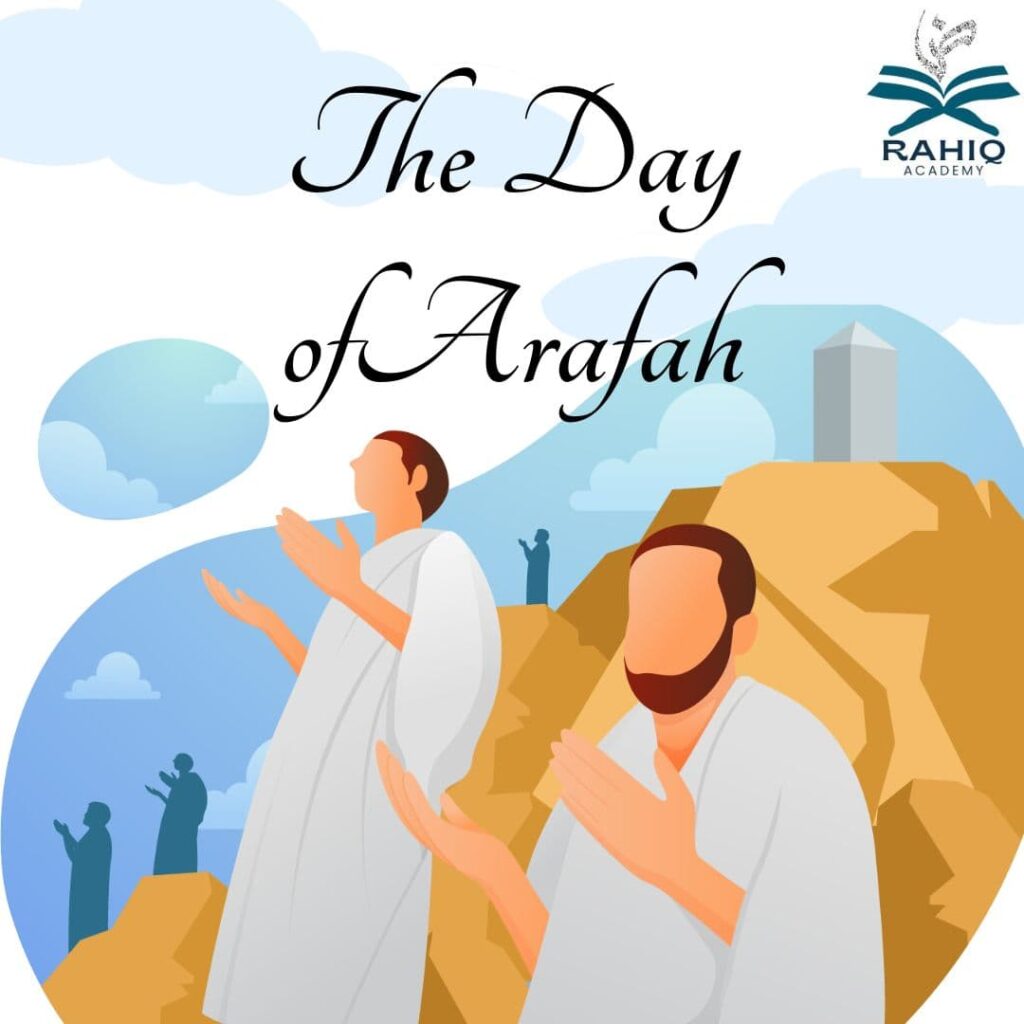Exploring the Profound Meaning, Virtues, and recommended actions of the day of Arafat
the benefits of Fasting on Arafat day , explore What to do on the Day of Arafah?
Significance of Arafat day for non-pilgrims , dua for day of Arafah and every thing you want to know about Arafat Day in this article.
Arafat Day Meaning
The Day of Arafat, also known as the “Day of Repentance,” is the 9th day of the Islamic month of Dhul-Hijjah.
Arafat Day meaning holds immense spiritual significance in Islam, marking the climax of the annual Hajj pilgrimage. On this day, millions of Muslims from around the world gather on the plains of Arafat, a granite hill located approximately 20 kilometers southeast of Makkah, in the valley of Arafah. The Day of Arafat is a pivotal moment in the Hajj pilgrimage, representing a time of deep reflection, worship, and supplication.
The name “Arafat” is derived from the Arabic root word “arafah,” which means “to know.” It is believed that this day symbolizes the knowledge and recognition of Allah’s greatness, as well as the opportunity for sincere repentance and seeking forgiveness for one’s sins.
Arafat Wuquf
The act of standing on the plains of Arafat, known as “Wuquf,” is considered the pinnacle of the Hajj pilgrimage. This standing is a moment of profound humility and submission to Allah (SWT), where pilgrims engage in earnest prayers, seeking mercy and forgiveness.
Verse of Perfection
The Day of Arafat holds a special place in Islamic history, as it was on this day that the final verses of the Holy Quran were revealed to the Prophet Muhammad (peace be upon him), marking the completion and perfection of the divine religion. Allah (SWT) says in the Quran:
“ٱلْيَوْمَ أَكْمَلْتُ لَكُمْ دِينَكُمْ وَأَتْمَمْتُ عَلَيْكُمْ نِعْمَتِى وَرَضِيتُ لَكُمُ ٱلْإِسْلَـٰمَ دِينًۭا ۚ فَمَنِ ٱضْطُرَّ فِى مَخْمَصَةٍ غَيْرَ مُتَجَانِفٍۢ لِّإِثْمٍۢ ۙ فَإِنَّ ٱللَّهَ غَفُورٌۭ رَّحِيمٌۭ ”
“This day I have perfected for you your religion and completed My favor upon you and have approved for you Islam as religion.”
(Surah Al-Maidah, 5:3)
This verse, known as the “Verse of Perfection,” emphasizes the significance of the Day of Arafat as the day when the religion of Islam was completed and the divine message was conveyed in its entirety. The revelation of this verse signifies the culmination of a divine mission, affirming that Islam, as a way of life, had reached its full maturity. This momentous event is commemorated every year by millions of Muslims, both those performing Hajj and those who are not, through various acts of worship and devotion.
Allah (SWT) says in the Quran:
“لَيْسَ عَلَيْكُمْ جُنَاحٌ أَن تَبْتَغُوا۟ فَضْلًۭا مِّن رَّبِّكُمْ ۚ فَإِذَآ أَفَضْتُم مِّنْ عَرَفَـٰتٍۢ فَٱذْكُرُوا۟ ٱللَّهَ عِندَ ٱلْمَشْعَرِ ٱلْحَرَامِ ۖ وَٱذْكُرُوهُ كَمَا هَدَىٰكُمْ وَإِن كُنتُم مِّن قَبْلِهِۦ لَمِنَ ٱلضَّآلِّينَ ”
سوة البقرة الآية “198
“There is no blame on you for seeking the bounty of your Lord ˹during this journey˺.1 When you return from ’Arafât,2 praise Allah near the sacred place3 and praise Him for having guided you, for surely before this ˹guidance˺ you were astray” (Surah Al-Baqrah, 2:198).
Fasting on the day of Arafat hadith
The Prophet Muhammad (peace be upon him) encouraged Muslims to fast on the Day of Arafat, as it holds tremendous rewards and blessings. In a hadith
عَنْ قَتَادَةَ بْنِ النُّعْمَانِ، قَالَ: سَمِعْتُ رَسُولَ اللَّهِ ـ صلى الله عليه وسلم ـ يَقُولُ: “ مَنْ صَامَ يَوْمَ عَرَفَةَ، غُفِرَ لَهُ سَنَةٌ أَمَامَهُ وَسَنَةٌ بَعْدَهُ ”
It was narrated that Qatadah bin Nu’man said:, the Prophet (peace be upon him) said:
“I heard the Messenger of Allah (ﷺ) say: ‘Whoever fasts the Day of ‘Arafah, his sins of the previous and following year will be forgiven.’”
This hadith highlights the immense virtue of fasting on the Day of Arafat, as it is a means of seeking forgiveness for past and future sins.
The Prophet (peace be upon him) emphasized the significance of this day by stating that there is no day on which Allah frees more souls from the Hellfire than on the Day of Arafat.
” عن عائشة رضي الله عنها قالت أن رسول الله صلى الله عليه وسلم، قال: “ما من يوم أكثر من أن يعتق الله فيه عبدًا من النار من يوم عرفة” ((رواه مسلم)).”
‘Aishah (May Allah be pleased with her) reported:
The Messenger of Allah (ﷺ) said, “There is no day on which Allah sets free more slaves from Hell than He does on the Day of ‘Arafah.” (Muslim)
This hadith reinforces the belief that the Day of Arafat is a day of immense forgiveness and mercy from Allah (SWT). It is a day when Allah (SWT) draws near to His servants and boasts about them to the angels, highlighting the importance of seeking forgiveness and repentance on this blessed day. The concept of divine forgiveness and the opportunity to cleanse one’s soul from sins resonates deeply within the hearts of believers, motivating them to engage in acts of worship and seek Allah’s mercy with sincere hearts.
What to do on the Day of Arafah?

For those who are not performing the Hajj pilgrimage, the Day of Arafat presents an opportunity to engage in various acts of worship and seek the forgiveness of Allah (SWT). Here are some recommended actions to observe on this auspicious day:
Fasting
As mentioned earlier, fasting on the Day of Arafat is highly recommended for those who are not performing Hajj. By fasting, one can attain the forgiveness of sins and draw closer to Allah (SWT). The physical act of fasting also serves as a means of developing self-discipline, empathy for the less fortunate, and a heightened sense of spirituality.
Making Dua (Supplication)
The Day of Arafat is a time when supplications are most likely to be answered by Allah (SWT). The Prophet (peace be upon him) said:
“The best supplication is that which is made on the day of Arafat.”
(Tirmidhi)
It is advisable to spend as much time as possible in worship, remembrance of Allah (SWT), and making sincere supplications, particularly during the peak hours between Dhuhr (midday) and Maghrib (sunset) prayers.
Believers are encouraged to beseech Allah (SWT) for their needs, express gratitude for His blessings, and seek guidance in all aspects of their lives.
Seeking Forgiveness
The Day of Arafat is a day of repentance and seeking forgiveness from Allah (SWT) for one’s sins. It is recommended to seek forgiveness wholeheartedly and renew one’s commitment to living a righteous life. This act of repentance is a profound acknowledgment of human fallibility and an earnest appeal for divine mercy and guidance.
Reciting Dhikr (Remembrance of Allah): Throughout the day, it is encouraged to recite various forms of dhikr, such as
- tahleel (La ilaha illallah)
- takbeer (Allahu Akbar)
- and tahmeed (Alhamdulillah).
The Prophet (peace be upon him) said:
“There are no days more beloved to Allah than these ten days (of Dhul-Hijjah), so increase in them your declaration of the oneness of Allah (tahleel), your exaltation of Him (takbeer), and your praise of Him (tahmeed).” (Ahmad)
Engaging in dhikr helps to purify the heart, strengthen one’s connection with Allah (SWT), and maintain a state of spiritual awareness and mindfulness.
Giving Charity
It is recommended to give charity on the Day of Arafat, as it is a means of purifying one’s wealth and attaining the pleasure of Allah (SWT).
The act of charity is particularly encouraged during the days of Dhul-Hijjah. Giving charity not only benefits those in need but also serves as a means of demonstrating compassion, gratitude, and social responsibility.
Dua for the Day of Arafah

On the Day of Arafat, it is recommended to recite the following dua, which was taught by the Prophet Muhammad (peace be upon him):
“لا إلَهَ إلَّا اللَّهُ وحدَهُ لا شريكَ لَهُ، لَهُ الملكُ ولَهُ الحمدُ وَهوَ على كلِّ شَيءٍ قديرٌ”
“Laa ilaaha illallahu wahdahu laa shareeka lahu, lahul mulku wa lahul hamdu wa huwa ‘alaa kulli shai’in qadeer.”
(“There is no deity worthy of worship except Allah alone, without any partner. To Him belongs the dominion, and to Him belongs all praise, and He has power over all things.”)
This dua, known as the “Dua of Arafat,” encompasses the essence of Islamic belief and highlights the oneness and greatness of Allah (SWT). Reciting this dua with sincerity and humility is a means of seeking forgiveness and attaining the pleasure of Allah (SWT) on this blessed day.
Significance of Arafat Day for Non-Pilgrims
While the Day of Arafat holds special significance for those performing the Hajj pilgrimage, it is equally important for Muslims who are not physically present at Arafat.
The virtues and rewards associated with this day are not limited to the pilgrims alone; rather, they extend to all believers who observe the recommended actions and seek the forgiveness of Allah (SWT).
For those who are unable to perform Hajj, the Day of Arafat presents an opportunity to connect with the spiritual essence of the pilgrimage and partake in the blessings and rewards associated with this day.
By fasting, making sincere supplications, seeking forgiveness, and engaging in acts of worship, one can attain the same spiritual benefits and earn the forgiveness of sins, as promised by the Prophet Muhammad (peace be upon him).
Additionally, the Day of Arafat serves as a reminder for all Muslims to reflect upon their relationship with Allah (SWT), repent for their shortcomings, and renew their commitment to living a life in accordance with the teachings of Islam. It is a day that encourages introspection, self-reflection, and a renewed dedication to seeking the pleasure of Allah (SWT) through righteous deeds and sincere worship.
Benefits of Fasting on Arafat Day
Benefits of Fasting on Arafat Day holds immense significance in the Islamic tradition, and fasting on this auspicious day carries numerous spiritual and religious benefits. As we delve into the virtues of fasting on Arafat, it becomes evident that this act of worship is a means of attaining forgiveness, purification, and closeness to Allah (SWT).
Forgiveness of Sins
One of the most profound benefits of fasting on the Day of Arafat is the forgiveness of sins. The Prophet Muhammad (peace be upon him) emphasized this virtue in a hadith narrated by Abu Qatadah:
“Fasting on the Day of Arafah absolves the sins for two years: the previous year and the coming year.” (Muslim)
This hadith highlights the immense reward associated with fasting on Arafat, as it is a means of seeking forgiveness for past and future sins. By fasting, believers can attain Allah’s mercy and absolution, thereby cleansing their souls from the burden of transgressions. This act of fasting serves as a powerful reminder of Allah’s boundless compassion and willingness to forgive those who sincerely repent and seek His forgiveness.
Drawing Closer to Allah (SWT)
Fasting on the Day of Arafat is an act of devotion that brings believers closer to Allah (SWT). It is an expression of obedience and submission to His divine will. The physical act of abstaining from food and drink, coupled with the spiritual act of supplication and remembrance, helps to strengthen one’s connection with the Creator. This heightened state of spirituality allows believers to experience a deeper sense of closeness to Allah (SWT), fostering a stronger bond of love and devotion.
Spiritual Purification
Fasting on the Day of Arafat serves as a means of spiritual purification. It is a time for self-reflection, repentance, and seeking forgiveness for one’s shortcomings. By fasting, believers engage in a process of inner purification, cleansing their hearts and minds from negative thoughts, behaviors, and attitudes. This act of fasting helps to purify the soul and renew one’s commitment to living a righteous and pious life.
Developing Self-Discipline and Patience
Fasting on the Day of Arafat requires self-discipline and patience. The act of abstaining from food, drink, and other physical needs during the day helps to develop self-control and restraint. This discipline extends beyond the physical realm, fostering patience and resilience in the face of life’s challenges. By practicing self-discipline, believers can cultivate a sense of inner strength and fortitude, enabling them to navigate the trials and tribulations of life with grace and perseverance.
Empathy and Compassion for the Less Fortunate
Fasting on the Day of Arafat allows believers to develop empathy and compassion for those who are less fortunate. By experiencing hunger and thirst, even for a short period, believers gain a deeper understanding of the struggles faced by those who are deprived of basic necessities. This heightened sense of empathy encourages acts of charity and generosity, fostering a spirit of compassion and social responsibility within the community.
Enhancing Spiritual Awareness and Mindfulness
Fasting on the Day of Arafat enhances spiritual awareness and mindfulness. The act of fasting serves as a constant reminder of Allah’s presence and the need for continuous devotion and worship. By abstaining from physical needs, believers are encouraged to focus on their spiritual well-being, engaging in acts of dhikr, supplication, and reflection. This heightened state of mindfulness helps to cultivate a sense of inner peace and tranquility, allowing believers to experience a deeper connection with Allah (SWT).
The Day of Arafat: A Historical Perspective

To fully appreciate the significance of the Day of Arafat, it is essential to explore its historical context and the events that have shaped its importance in the Islamic tradition.
1. The Farewell Sermon of Prophet Muhammad (peace be upon him)
One of the most significant events associated with the Day of Arafat is the Farewell Sermon delivered by the Prophet Muhammad (peace be upon him) during his final pilgrimage.
On the 9th of Dhul-Hijjah, in the year 10 AH (632 CE), the Prophet Muhammad (peace be upon him) stood on the plains of Arafat and addressed the assembled pilgrims in a powerful and eloquent sermon that encapsulated the core principles of Islam.
In his Farewell Sermon, the Prophet (peace be upon him) emphasized the importance of justice, equality, and the sanctity of human life. He called for the abolition of pre-Islamic practices of ignorance and oppression, and he reaffirmed the rights and responsibilities of Muslims towards one another. The sermon also included a reminder of the five pillars of Islam and the significance of adhering to the teachings of the Quran and Sunnah.
Some key excerpts from the Farewell Sermon include:
- “O people, lend me an attentive ear, for I know not whether, after this year, I shall ever be amongst you again. Therefore listen to what I am saying to you very carefully and take these words to those who could not be present here today.”
- “All mankind is from Adam and Eve. An Arab has no superiority over a non-Arab, nor does a non-Arab have any superiority over an Arab; a white has no superiority over a black, nor does a black have any superiority over a white; none have superiority over another except by piety and good action.”
- “Remember, one day you will appear before Allah and answer for your deeds. So beware, do not stray from the path of righteousness after I am gone.”
The Farewell Sermon is a timeless reminder of the values and principles that underpin the Islamic faith. It serves as a testament to the Prophet’s (peace be upon him) enduring legacy and his commitment to establishing a just and compassionate society based on the teachings of Islam.
2. The Revelation of the Final Verses of the Quran
The Day of Arafat is also significant because it marks the revelation of the final verses of the Holy Quran to the Prophet Muhammad (peace be upon him). As mentioned earlier, Allah (SWT) revealed the following verse on this day:
“This day I have perfected for you your religion and completed My favor upon you and have approved for you Islam as religion.”
(Surah Al-Maidah, 5:3)
This verse, known as the “Verse of Perfection,” signifies the completion of the divine message and the perfection of the Islamic faith. The revelation of this verse on the Day of Arafat underscores the importance of this day in the Islamic tradition and its association with the culmination of the Prophet’s (peace be upon him) mission.
3. The Practice of Wuquf: The Standing at Arafat
The practice of standing at Arafat, known as “Wuquf,” is a central ritual of the Hajj pilgrimage. Pilgrims gather on the plains of Arafat from noon until sunset on the 9th of Dhul-Hijjah, engaging in acts of worship, supplication, and reflection. The act of standing at Arafat is a symbolic representation of the Day of Judgment, where believers will stand before Allah (SWT) and be held accountable for their deeds.
The Prophet Muhammad (peace be upon him) emphasized the importance of Wuquf in a hadith narrated by Jabir ibn Abdullah:
“Hajj is Arafah. Whoever reaches the night of Arafah before the dawn of the following day has completed his Hajj.” (Tirmidhi)
This hadith highlights the centrality of the standing at Arafat in the Hajj pilgrimage, underscoring its significance as the culmination of the pilgrim’s journey. The practice of Wuquf serves as a powerful reminder of the transient nature of life and the need for continuous devotion and repentance.
The Spiritual and Emotional Impact of the Day of Arafat
The Day of Arafat holds a profound spiritual and emotional impact on believers, both those who are physically present at Arafat and those who observe the day from afar. The significance of this day extends beyond the rituals and acts of worship, touching the hearts and souls of believers in a deeply transformative way.
A Day of Reflection and Repentance
The Day of Arafat is a time for deep reflection and repentance. It is an opportunity for believers to contemplate their lives, assess their deeds, and seek forgiveness for their shortcomings. The act of standing at Arafat, whether physically or metaphorically, serves as a reminder of the Day of Judgment, prompting believers to renew their commitment to living a righteous and pious life.
A Day of Unity and Brotherhood
The Day of Arafat is a symbol of unity and brotherhood among Muslims. Pilgrims from diverse backgrounds and nationalities gather on the plains of Arafat, standing shoulder to shoulder in a display of solidarity and equality. This unity transcends geographical and cultural boundaries, emphasizing the universal nature of the Islamic faith and the shared bond of brotherhood among believers.
A Day of Divine Mercy and Forgiveness
The Day of Arafat is a day of divine mercy and forgiveness. Allah (SWT) draws near to His servants, expressing His pride to the angels and freeing more souls from the Hellfire than on any other day. This immense outpouring of divine mercy provides believers with a unique opportunity to seek forgiveness and attain Allah’s pleasure. The knowledge of Allah’s boundless compassion and willingness to forgive instills a sense of hope and reassurance in the hearts of believers.
A Day of Spiritual Renewal and Transformation
The Day of Arafat is a day of spiritual renewal and transformation. Through acts of worship, supplication, and reflection, believers can experience a profound sense of spiritual awakening and rejuvenation.
This heightened state of spirituality allows believers to reconnect with their faith, deepen their devotion, and strengthen their relationship with Allah (SWT). The transformative impact of the Day of Arafat extends beyond the day itself, inspiring believers to carry the lessons and insights gained into their daily lives.
Conclusion: Embracing the Significance of the Day of Arafat
The Day of Arafat holds immense significance in the Islamic tradition, offering numerous spiritual and religious benefits for believers. From fasting and making sincere supplications to seeking forgiveness and giving charity, the acts of worship associated with this day provide a means of attaining forgiveness, purification, and closeness to Allah (SWT). As we approach the Day of Arafat, let us embrace the opportunity to engage in these acts of worship, reflect on our relationship with Allah (SWT), and renew our commitment to living a life in accordance with the teachings of Islam. May Allah (SWT) accept our efforts, forgive our shortcomings, and grant us His boundless mercy and blessings on this blessed day. Ameen.
Want to take your Arabic and Quranic studies to the next level?
Explore our comprehensive Online Courses designed for all skill sets!
Visit our Website to learn more, book Your Free Evaluation and enroll today.




